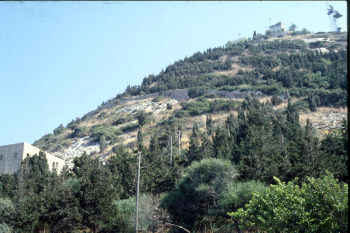
 |

_350x475.jpg) |
In the 3rd year of the reign of Akh•âvꞋ ![]() over Yi•sᵊr•â•eilꞋ,
over Yi•sᵊr•â•eilꞋ,![]() a wretching famine persisted; and Eil•i•yâhꞋu perceived the DᵊvarꞋ é‑‑ä to be:
a wretching famine persisted; and Eil•i•yâhꞋu perceived the DᵊvarꞋ é‑‑ä to be:
“Go present yourself to Akh•âvꞋ and I will provide rain
upon the face of hâ-a•dâm•âhꞋ.”
Upon seeing Eil•i•yâhꞋu, Akh•âvꞋ shouted, “It’s you, the inciter of Yi•sᵊr•â•eilꞋ!!!”
”It’s not me who has incited Yi•sᵊr•â•eilꞋ,” Eil•i•yâhꞋu retorted, “but you and your father’s household, by abandoning the mi•tzᵊwōtꞋ é‑‑ä to follow ha-BaꞋal!
”So now, send out the word: gather all of Yi•sᵊr•â•eilꞋ to me at Har Ka•rᵊm•ëlꞋ, including the 450 nᵊviy•eiꞋ![]() ha-
ha-BaꞋal and the 400 nᵊviy•eiꞋ![]() hâ-A•shᵊr•âhꞋ—who dine at the shū•lᵊkh•ânꞋ of your wife,
hâ-A•shᵊr•âhꞋ—who dine at the shū•lᵊkh•ânꞋ of your wife,![]() Iy-ZëvꞋël.
Iy-ZëvꞋël.![]()
 |
So Akh•âvꞋ sent out the word for all of Bᵊn•eiꞋ-Yi•sᵊrâ•eilꞋ,![]() gathering the Nᵊviy•imꞋ at Har Ka•rᵊm•ëlꞋ.
gathering the Nᵊviy•imꞋ at Har Ka•rᵊm•ëlꞋ.
Then Eil•i•yâhꞋu addressed ![]() hâ-âm saying, “How long are you
hâ-âm saying, “How long are you![]() going to do passovers back-and-forth between the two mutual-exclusives? If é‑‑ä is ha-ël•ōh•imꞋ then follow after Him. Or, if ha-
going to do passovers back-and-forth between the two mutual-exclusives? If é‑‑ä is ha-ël•ōh•imꞋ then follow after Him. Or, if ha-BaꞋal then follow it.”
So Eil•i•yâhꞋu told hâ-âm, ”I, alone, am the only Nâ•viꞋ for é‑‑ä left,![]() while there are 450 nᵊviy•eiꞋ
while there are 450 nᵊviy•eiꞋ![]() ha-
ha-BaꞋal. Let them provide two bulls (so they can know there’s no special trick in my bull). Let them choose whichever bull they wish and butcher it and place it on a pile of wood but without any fire under it. They I will do the other bull and place it on another pile of wood without any fire under it. Then you![]() call in ha-sheim of your
call in ha-sheim of your![]() ël•ōh•imꞋ for fire to come down and light your
ël•ōh•imꞋ for fire to come down and light your![]() fire. Then I will call in ha-Sheim of é‑‑ä to light my fire. Then let whichever ël•ōh•imꞋ answers by lighting a fire be ha-ël•ōh•imꞋ.“
fire. Then I will call in ha-Sheim of é‑‑ä to light my fire. Then let whichever ël•ōh•imꞋ answers by lighting a fire be ha-ël•ōh•imꞋ.“
Then all of hâ-âm responded saying, “Well spoken.”
Eil•i•yâhꞋu allowed the nᵊviy•eiꞋ![]() ha-
ha-BaꞋal to go first.
So the the nᵊviy•eiꞋ![]() ha-
ha-BaꞋal called in ha-Sheim of BaꞋal from morning until noon; they even performed jumpings over the mi•zᵊbeiꞋakh that they had built. But, of course, nothing happened.
After hours of this, when nothing had happened, Eil•i•yâhꞋu began to make fun of them. “Shout louder! Since it’s an ël•ōh•imꞋ, maybe it’s busy talking with one of the other ël•ōh•imꞋ.”
After a while, Eil•i•yâhꞋu poked fun at them again. “Louder! Maybe it’s moved to Syria or Egypt!”
Still later, Eil•i•yâhꞋu ridiculed them again. “Keep it up! Maybe it’s on the way.”
Later still, Eil•i•yâhꞋu derided them. “Maybe it’s sleeping. Wake it up!”
The nᵊviy•eiꞋ![]() ha-
ha-BaꞋal called in ha-Sheim of BaꞋal shouted and cut themselves with swords and lances until they were bleeding profusely, according to their custom.![]() They continued this prophesying until the time for Mi•nᵊkh•âhꞋ—but nothing happened.
They continued this prophesying until the time for Mi•nᵊkh•âhꞋ—but nothing happened.
So, when it was time for Mi•nᵊkh•âhꞋ, Eil•i•yâhꞋu beckoned all of hâ-âm to gather around him. Then he rebuilt the Mi•zᵊbeiꞋakh é‑‑ä, which the Nᵊviy•eiꞋ![]() ha-
ha-BaꞋal had destroyed.
Then Eil•i•yâhꞋu took 12 stones—according to the number of Shᵊvât•imꞋ of Bᵊn•eiꞋ-Ya•a•qōvꞋ who perceived the DᵊvarꞋ é‑‑ä that said,
“Your sheim shall be Yi•sᵊr•â•eilꞋ.”
He used the 12 stones to build a mi•zᵊbeiꞋakh in ha-Sheim of é‑‑ä. Then he dug a moat around the mi•zᵊbeiꞋakh wide enough and deep enough to fit a 15 kg bag![]() of seed, arranged the wood again, butchered the bull and laid it on the wood.
of seed, arranged the wood again, butchered the bull and laid it on the wood.
The he said, “Fill four khad•imꞋ![]() with water
with water![]() and pour it on the ōl•âhꞋ.” Then he had them do it a second and third time, until water was dripping down in rivulets all around the mi•zᵊbeiꞋakh. Then he had them fill the moat with water as well.
and pour it on the ōl•âhꞋ.” Then he had them do it a second and third time, until water was dripping down in rivulets all around the mi•zᵊbeiꞋakh. Then he had them fill the moat with water as well.
When it became time for Mi•nᵊkh•âhꞋ, Eil•i•yâhꞋu ha-Nâ•viꞋ approached the mi•zᵊbeiꞋakh saying, “é‑‑ä ël•ōh•eiꞋ Avᵊrâ•hâmꞋ, Yi•tzᵊkhâqꞋ wᵊYi•sᵊr•â•eilꞋ; let it be made known today that You![]() are ël•ōh•imꞋ in Yi•sᵊr•â•eilꞋ and that I am Your
are ël•ōh•imꞋ in Yi•sᵊr•â•eilꞋ and that I am Your![]() servant and it is by Your
servant and it is by Your![]() DᵊvarꞋ that I’ve done all of these ha-dᵊvâr•imꞋ. Answer me, é‑‑ä! Answer me so that this am may know that You
DᵊvarꞋ that I’ve done all of these ha-dᵊvâr•imꞋ. Answer me, é‑‑ä! Answer me so that this am may know that You![]() are é‑‑ä ha-ël•ōh•imꞋ—and it is You
are é‑‑ä ha-ël•ōh•imꞋ—and it is You ![]() Who shall have spun their heart around 180°!”
Who shall have spun their heart around 180°!”
Then an eish é‑‑ä![]() came down from the sky and engulfed the ōl•âhꞋ, along with the wood, the stones and the dust
came down from the sky and engulfed the ōl•âhꞋ, along with the wood, the stones and the dust![]() —vaporizing the water from the moat.
—vaporizing the water from the moat.![]()
 350x263.jpg) |
Now when all of hâ-âm saw this they fell on their faces, saying,
Then Eil•i•yâhꞋu told them, “Take the Nᵊviy•eiꞋ![]() ha-
ha-BaꞋal into custody! Don’t let an ish of them escape!”
So they took them into custody. Then Eil•i•yâhꞋu marched them down to NaꞋkhal Qi•shōnꞋ, where he had them slaughtered.

Optional parental preparation:
 |
| 5 gal. bucket |
18.34 ëÌÇã =2 bat, i.e. ≈45 li.![]() (≈12 gal.); ea bat ≈22 li.
(≈12 gal.); ea bat ≈22 li.![]() Pottery weighing roughly the same as glass, this equates to a 12 gal. aquarium tank, which, when filled to capacity, would weigh ≈61 kg. (≈135 lbs); a lot, even if not filled to capacity, for RiꞋvᵊq•âh to set down from her shoulder, pour from it for a stranger, then muscle it back up on her shoulders to carry the rest home (bᵊ-Reish•itꞋ 24.14). This urn would have the capacity of a 12-gal. aquarium — whose dimensions (stood on end like a cube-shaped tank) would be 39.4 cm (15.5") H x 28.6 cm (11.25") W x 18.8 cm (7.4") D. Therefore, 4 kad•imꞋ would be nearly 200 li. (≈50 gal.) of water! Three cycles of 200 li. (50 gal.) each was ≈600 li. (150 gal.); i.e. 30 5-gal. buckets of water!
Pottery weighing roughly the same as glass, this equates to a 12 gal. aquarium tank, which, when filled to capacity, would weigh ≈61 kg. (≈135 lbs); a lot, even if not filled to capacity, for RiꞋvᵊq•âh to set down from her shoulder, pour from it for a stranger, then muscle it back up on her shoulders to carry the rest home (bᵊ-Reish•itꞋ 24.14). This urn would have the capacity of a 12-gal. aquarium — whose dimensions (stood on end like a cube-shaped tank) would be 39.4 cm (15.5") H x 28.6 cm (11.25") W x 18.8 cm (7.4") D. Therefore, 4 kad•imꞋ would be nearly 200 li. (≈50 gal.) of water! Three cycles of 200 li. (50 gal.) each was ≈600 li. (150 gal.); i.e. 30 5-gal. buckets of water! ![]()
 |
18.34 water —Readers rarely ask “Who was writing down the narrative here?” The writer, referring to Eil•i•yâhꞋu in the 3rd person, is an observer. Readers must not assume that the observer-writer was aware of everything in the mind of Eil•i•yâhꞋu, who is documented to have exercised knowledge well advanced beyond his peers; considered supernatural by the masses of the time. Thus, it’s documented (v. 18.42-46), Eil•i•yâhꞋu understood how to predict the approach, on Israel’s prevailing winds, from the northwest of a cumulonimbus (raincloud) out at sea. A growing cumulonimbus cloud approaching from the sea signaled a thunderstorm coming ashore in Israel. He also seems to have understood that 1. a wet altar, 2. protruding skyward, 3. from a mountaintop, 4. in the approach of a thunderstorm, is likely to attract lightning strikes (regarded by the masses to be “fire of ël•ōh•imꞋ”)—that “supernaturally” started “holy” fires.
Additionally, what the observer-narrator may have assumed to be water may instead have been, for example, naphtha, which, even then, was known by the most highly educated to be a fire accelerant. ![]()
Questions you might anticipate that your child might raise and be prepared to discuss:
What is a moat?
What is a rivulet?
Explain 180°?
What does “engulf” mean?
What does “vaporize” mean?
What does it mean to take someone into custody?
![]()
 |
 |